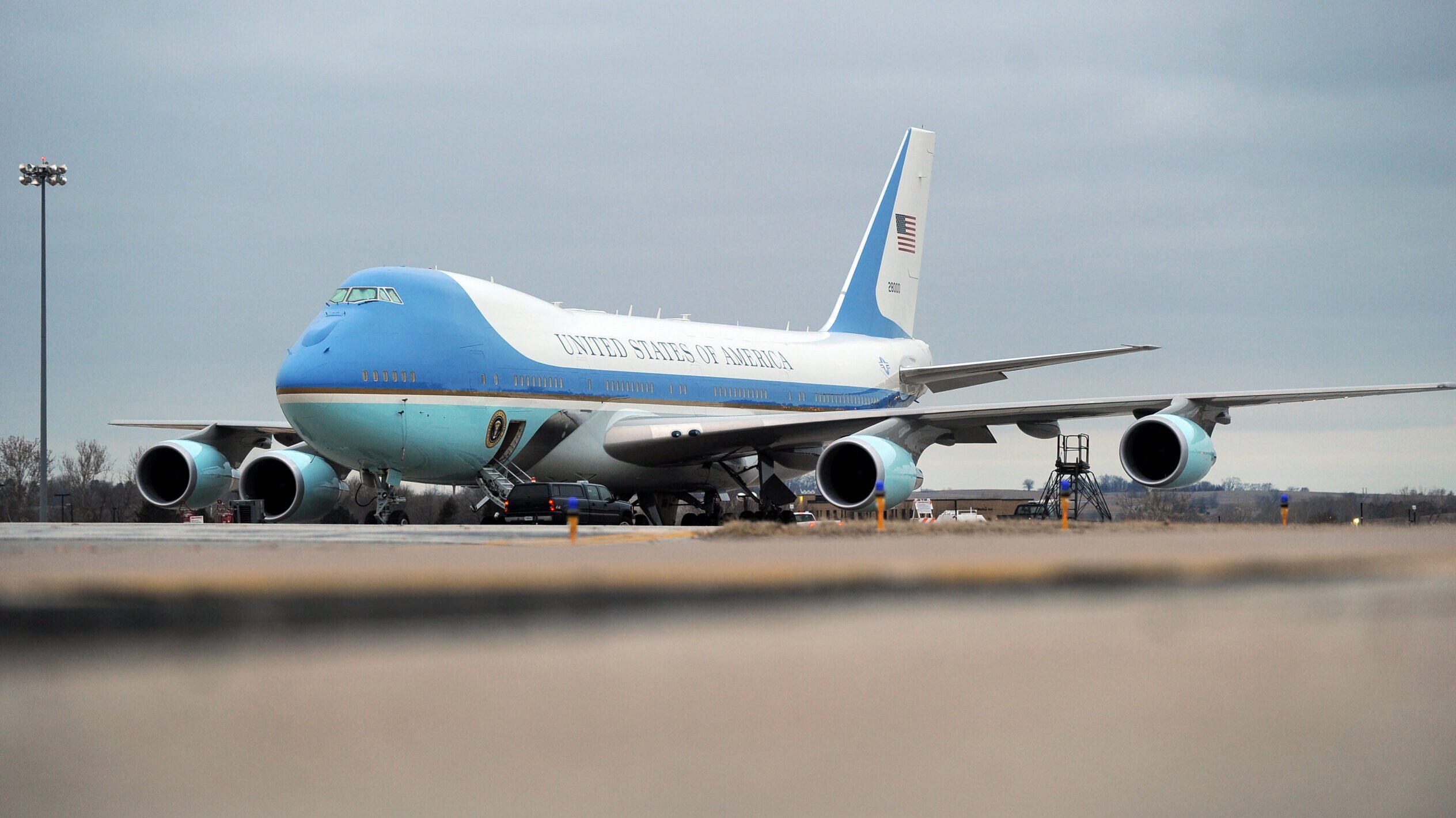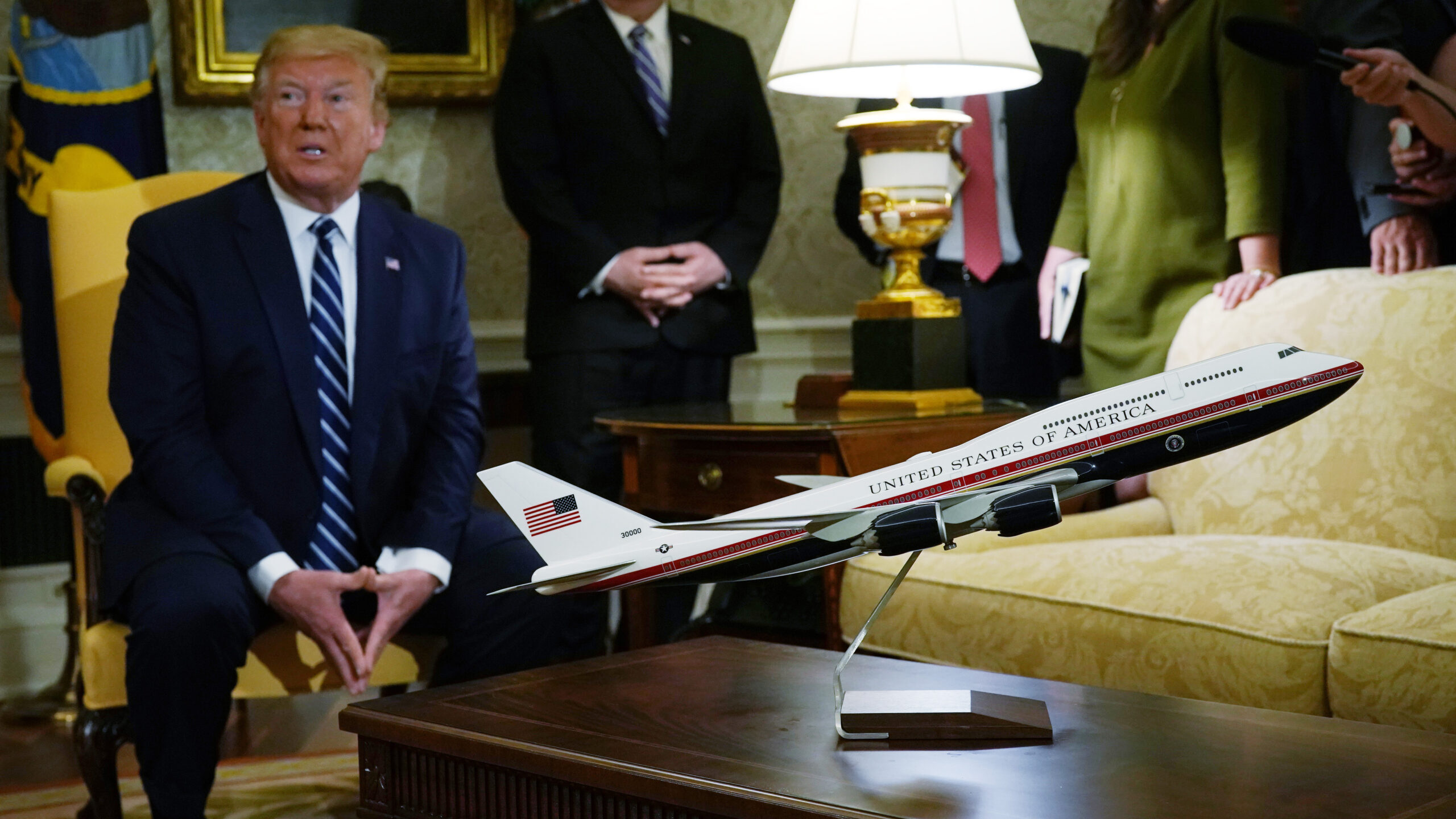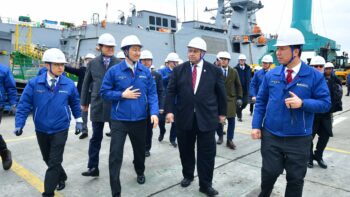
A VC-25A Air Force One aircraft sits on a ramp at Offutt Air Force Base, Nebraska during a brief stop Jan. 22. The aircraft is one of two modified Boeing 747 Airliners that serve as a transport aircraft for the President of the United States. (U.S. Air Force/Josh Plueger)
Updated on 4/27/22 at 1:44pm to include information from Boeing’s earnings call with investors and SEC filings. A previous version of the story erroneously stated that today’s charge was the first for the T-7, but SEC filings state that cost overruns for the program date back to 2018.
WASHINGTON: Boeing’s Air Force One replacement program and its T-7A Red Hawk training jet racked up more than $1 billion in charges for the company so far in 2022, the company reported this morning.
The VC-25B program, better known as the Air Force One replacement, recorded a $660 million pre-tax charge. That means the program has now exceeded its budget by about $1.1 billion — more than a quarter of the $3.9 billion fixed price contract Boeing inked with the Air Force in 2018.
Boeing attributed the VC-25B charge to “higher supplier costs, higher costs to finalize technical requirements and schedule delays.”
Meanwhile, the T-7A Red Hawk program recorded a $367 million charge that was “primarily driven by ongoing supplier negotiations impacted by supply chain constraints, COVID-19 and inflationary pressures,” Boeing said in a press release for its first quarter 2022 earnings.
The company’s SEC filings revealed several other cost overruns incurred during the quarter, including:
- a $165 million loss by the KC-46 tanker program, driven by “higher supply chain and other costs”
- a $78 million charge to the MQ-25 tanker drone program, caused by “by additional customer testing requirements and supplier quality challenges.”
During an earnings call with investors, Boeing CEO Dave Calhoun even went so far as to imply its VC-25B contract with the Air Force — which then-CEO Dennis Muilenburg negotiated directly with then-President Donald Trump, who threatened to cancel the program — was a mistake.
“Air Force One, I’m just going to call a very unique moment, a very unique negotiation, a very unique set of risks that Boeing probably shouldn’t have taken,” he said. “But we are where we are, and we’re going to deliver great airplanes. And we’re going to recognize the costs associated with it.”

A model of the proposed paint scheme of the next generation of Air Force One is on display in the Oval Office of the White House June 20, 2019 in Washington, DC. (Photo by Alex Wong/Getty Images)
The company currently finds itself in a predicament where at least four development programs — the T-7A, VC-25B, KC-46 tanker, MQ-25 tanker drone — are managed under a fixed price contract structure where Boeing is responsible for covering cost overruns, a rarity in defense contracting. Calhoun said that his approach to fixed-price development programs differs from his predecessors, adding that he hopes never to “contribute to that issue.”
“I think those are going to be really good bet even though the development costs are more than we had anticipated,” Calhoun said of the MQ-25 and T-7. “When we get through them all and deliver on those contracts, those airplanes don’t go away. There are futures attached to them and big programs in our view that involve many, many airplanes.”
While the T-7 program had been relatively smooth sailing up until now, the VC-25B program has been beset with problems for the past couple of years.
Boeing announced the first cost overrun on the VC-25B program in April 2020, a $168 million charge it attributed to “engineering inefficiencies” caused by the ongoing COVID-19 pandemic, Defense News reported. Then, in May 2021, it announced a $318 million charge due, in large part, to “performance issues at a key supplier.”
That subcontractor turned out to be the now-defunct GDC Technics, which was previously under contract to build the interiors of the VC-25B. Last year, Boeing cancelled the contract and sued GDC, alleging that the company had fallen more than a year behind. GDC, which has since filed for bankruptcy, countersued Boeing.
Earlier this month, The Wall Street Journal reported further problems at Boeing’s San Antonio, Texas, facility where two Boeing 747s are being transformed into new Air Force One planes. According to the report, Boeing employees risked damaging one of the two planes when employees placed it on jacks not able to withstand the weight of the plane.
The Air Force now expects the program to run at least two years late, which would delay the first VC-25B from 2024 to 2026 at the very earliest. However, the Air Force has not yet approved a new baseline schedule for the program, with an Air Force spokeswoman telling Breaking Defense earlier this month that “a final determination on the updated Acquisition Program Baseline will be made by the defense acquisition executive” — in this case, Bill LaPlante, undersecretary of defense for acquisition and sustainment — “after further review.”
Norway’s top officer on his ‘biggest challenge,’ next frigate and new NATO neighbors
Gen. Eirik Kristoffersen, Norway’s Chief of Defense, talks to Breaking Defense about his plans for spending on new frigates and subs, the challenges of upgrading Norway’s “digital backbone” and refilling the military’s stocks.


























